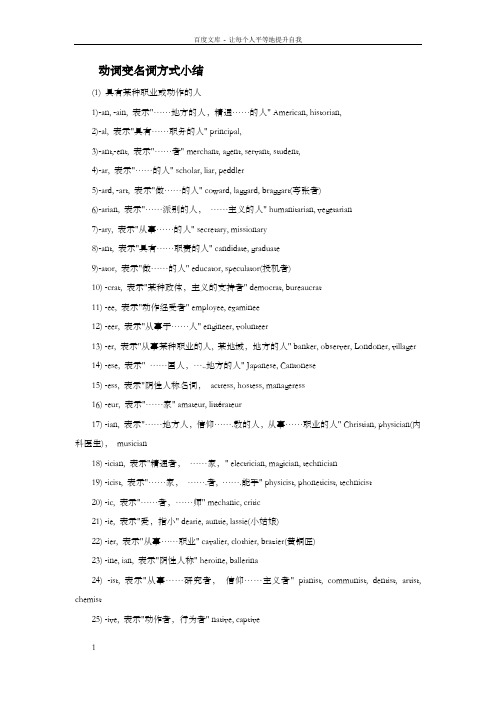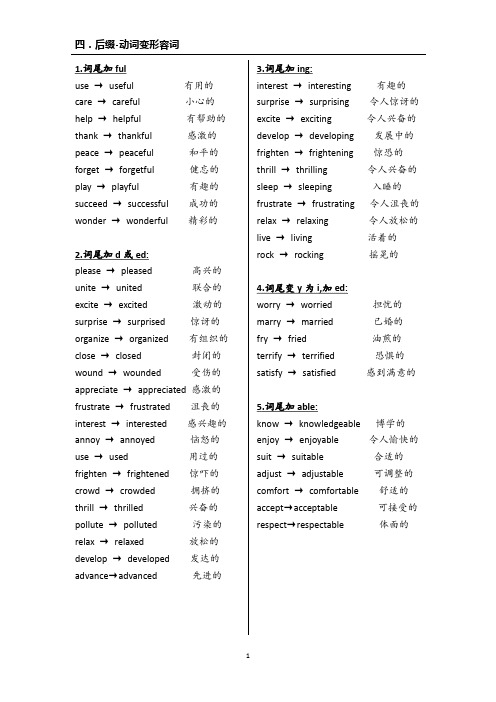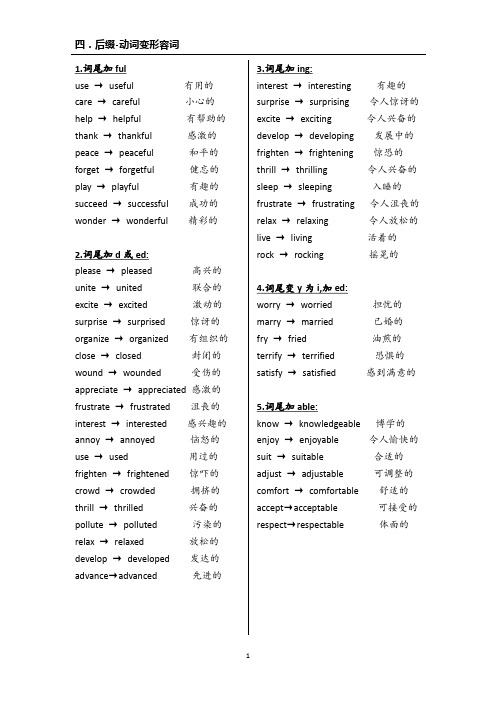动词变形容词小结
- 格式:docx
- 大小:96.78 KB
- 文档页数:3

英语动词变形容词规则口诀
【实用版】
目录
1.英语动词变形容词的规则
2.动词变形容词的口诀
正文
一、英语动词变形容词的规则
在英语中,动词变形容词是一种常见的语法现象。
动词通过变化形式,可以表达形容词的意义,用于描述人或事物的特性、状态等。
英语动词变形容词的规则主要有以下几点:
1.在动词原形后加-ful,-able,-ish,-ive,-ous 等后缀,构成形容词。
2.有些动词在变形容词时,需要去掉词尾的-e,再加上上述后缀。
3.部分动词在变形容词时,需要进行其他形式的变化。
二、动词变形容词的口诀
为了帮助大家更好地记忆这些规则,这里提供一个口诀:
“有形加-ful,有能力加-able,有愿望加-ish,有特征加-ive,有
性质加-ous。
”
这个口诀概括了英语动词变形容词的主要规则,只要掌握了这个口诀,就可以轻松地将动词变为形容词。
例如,以“run”(跑)为例,根据口诀,我们可以得出其形容词形式为“run-able”,意为“可跑的”。
同样地,“sleep”(睡)的形容词形式
为“sleep-ful”,意为“使人困倦的”。
通过以上讲解,相信大家已经对英语动词变形容词的规则有了一定的
了解。

动词变名词方式小结(1) 具有某种职业或动作的人1)-an, -ain, 表示"……地方的人,精通……的人" American, historian,2)-al, 表示"具有……职务的人" principal,3)-ant,-ent, 表示"……者" merchant, agent, servant, student,4)-ar, 表示"……的人" scholar, liar, peddler5)-ard, -art, 表示"做……的人" coward, laggard, braggart(夸张者)6)-arian, 表示"……派别的人,……主义的人" humanitarian, vegetarian7)-ary, 表示"从事……的人" secretary, missionary8)-ant, 表示"具有……职责的人" candidate, graduate9)-ator, 表示"做……的人" educator, speculator(投机者)10) -crat, 表示"某种政体,主义的支持者" democrat, bureaucrat11) -ee, 表示"动作经受者" employee, examinee12) -eer, 表示"从事于……人" engineer, volunteer13) -er, 表示"从事某种职业的人, 某地域,地方的人" banker, observer, Londoner, villager14) -ese, 表示" ……国人,…..地方的人" Japanese, Cantonese15) -ess, 表示"阴性人称名词,actress, hostess, manageress16) -eur, 表示"……家" amateur, littérateur17) -ian, 表示"……地方人,信仰…….教的人,从事……职业的人" Christian, physician(内科医生),musician18) -ician, 表示"精通者,……家," electrician, magician, technician19) -icist, 表示"……家,…….者, …….能手" physicist, phoneticist, technicist20) -ic, 表示"……者,……师" mechanic, critic21) -ie, 表示"爱,指小" dearie, auntie, lassie(小姑娘)22) -ier, 表示"从事……职业" cavalier, clothier, brazier(黄铜匠)23) -ine, ian, 表示"阴性人称" heroine, ballerina24) -ist, 表示"从事……研究者,信仰……主义者" pianist, communist, dentist, artist, chemist25) -ive, 表示"动作者,行为者" native, captive26) -logist, 表示"……学家,研究者" biologist, geologist(地质学家)27) -or, 表示"……者" author, doctor, operator,28) -ster, 表示"做…….情形的人" youngster, gamester(赌徒),songster29) -yer, 表示" 从事……职业者" lawyer(2). 组成,具有抽象名词的含义1) -acy, 表示"性质,状态,境遇" accuracy, diplomacy2) -age, 表示"状态,行为,身份及其结果,总称" courage, storage, marriage3) -al, a) 表示"事物的动作,进程" refusal, arrival, survival, denial, approvalb) 表示具体的事物manual, signal, editorial, journal4) -ance, -ence表示"性质,状况,行为,进程,总量,程度" endurance, importance, diligence, difference, obedience5) -ancy, -ency, 表示"性质,状态,行为,进程" frequency, urgency, efficiency,6) -bility, 表示"动作,性质,状态" possibility, feasibility,7) -craft, 表示"工艺,技能" woodcraft, handicraft, statecraft(治国策)8) -cracy, 表示"统治,支配" bureaucracy, democracy9) -cy, 表示"性质,状态,职位,级别" bankruptcy(破产),supremacy10) -dom, 表示"品级,领域,状态" freedom, kingdom, wisdom11) -ery, -ry, 表示"行为,状态,习性" bravery, bribery, rivalry12) -ety, 表示"性质,状态" variety, dubiety(怀疑)13) -faction, -facture, 表示"作成,……化,作用" satisfaction, manufacture14) -hood, 表示"资格,身份, 年纪,状态" childhood, manhood, falsehood15) -ice, 表示"行为,性质,状态" notice, justice, service16) -ine, 表示"带有抽象概念" medicine, discipline, famine17) -ing, 表示"动作的进程,结果" building, writing, learning18) -ion, -sion, -tion, -ation, -ition, 表示"行为的进程,结果,状况" action, solution, conclusion, destruction, expression, correction19) -ise, 表示"性质,状态" exercise, merchandise(商业)20) -ism, 表示"制度,主义,学说,信仰,行为" socialism, criticism, colloquialism, heroism21) -ity, 表示"性质,状态,程度" purity, reality, ability, calamity22) -ment, 表示"行为,状态,进程,手腕及其结果treatment, movement, judgment,punishment, argument23) -mony, 表示"动作的结果,状态" ceremony, testimony24) -ness, 表示"性质,状态,程度" goodness, kindness, tiredness, friendliness25) -or, -our, 表示"动作,性质,状态" favor, error,26) -osity, 表示"动作,状态" curiosity27) -ship, 表示"情形,性质,技能,技术及身份,职业" hardship, membership, friendship28) -th, 表示"动作,性质,进程,状态" depth, wealth, truth, length, growth29) -tude, 表示"性质,状态,程度" latitude, altitude(海拔)30) -ure, 表示"行为,结果" exposure, pressure, failure, procedure(手续),31) -y, 表示"行为的结果,状态,性质" glory, history, victory, inquiry(3) 带有场所,地方的含义1) -age, 表示"居处,地址" village, cottage2) -ary, 表示"居处,场地" library, granary (谷仓)3) -ery, ry, 表示"工作场所,饲养所,地址" laundry, nursery, surgery(手术室)4) -ory, 表示"工作场所,住处" factory, dormitory, laboratory, observatory(4) 带有学术,科技含义1) -grapy, 表示"……学,写法" biography, calligraphy, geography2) -ic, ics, 表示"……学……法" logic, mechanics, optics, electronics3) -ology, 表示"……学……论" biology, zoology, technology(工艺学)4) -nomy, 表示"……学……术" astronomy, economy, bionomy(生态学)5) -ery, 表示"学科,技术" chemistry, cookery, machinery6) -y, 表示"……学,术,法" photography, philosophy(5) 表示人和事物的总和,集合含义1) -age, baggage, tonnage2) -dom, newspaperdom(新闻界)3)-hood, neighbourhood, womanhood4)-ery, cavalry, ministry(内阁)5)-ure, legislature, judicature(6) 表示物品和物质名称的含义1) -ant, ent, solvent, constant2) -al, signal, pictorial(画报)3) ar, collar, pillar(石柱)4) - er, boiler, computer, washer, cooker5) -ery, drapery(绸缎)6) -ing, clothing, matting,7) -ment, instrument, equipment, attachment(7) 表示"细些的含义1)-cle, particle,2)-cule, molecule(分子)3)-el, parcel4)-en, chicken, maiden5)-et, pocket, ticket6)-etta, -ette, etto, cigarette, essayette(短文)7)-kin, napkin8)-ling, duckling,9)-let, booklet10) -y, baby, doggy动词变形容词小结1.词尾加ful:use - useful, care - careful, help - helpful,thank - thankfulpeace - peaceful, forget - forgetful, play - playful,succeed - successful, wonder - wonderful2.词尾加d或ed:please - pleased, unite - united, excite - excited,surprise - surprised, organize - organized, close - closed,wound - wounded, relax - relaxed,develop - developed,appreciate - appreciated,frustrate - frustrated,interest - interested, annoy - annoyed, use - used,frighten - frightened, crowd - crowded, thrill - thrilled,pollute - polluted3.词尾加ing:interest - interesting, surprise - surprising, excite - excitingdevelop - developing, frighten - frightening,thrill - thyrillingfrustrate - frustrating, relax _ relaxing, live - livingrock - rocking, sleep - sleeping4.词尾变y为i,加ed:worry - worried, marry - married,fry - fried, terrify - terrifiedsatisfy - satisfied5.词尾加able:know - knowledgeable, enjoy - enjoyabe,suit - suitableadjust - adjustable, comfort - comfortable6.其它:lose - lost, fool - foolish, live - lively / alive /living,sleep - sleepy / sleeping / asleep,wake - awake, taste - tastyspeak - spoken, break - broken, die - dead, educate - aducational, world – worldwide名词变形容词的方式小结1.名词后加-y, 如:luck→lucky, cloud→cloudy; wind→windy; rain→rainy;sun→sunny, snow→snowy noise-noisy health→healthy2.在名词后加-ly, 如:friend→friendly love→lovely day→daily3.方位名词加-ern,如:east→eastern west→western south→southern north→northern形容词后缀(1)带有“属性,偏向,相关”的含义1)-able, -ible, movable, comfortable, applicable, visible, responsible2)-al, natural, additional, educational3)-an, ane, urban, suburban, republican4)-ant, -ent, distant, important, excellent5)-ar, similar, popular, regular6)-ary, military, voluntary7)-ice, -atie, ical, politic, systematic, historic, physical,8)-ine, masculine, feminine, marine9)-ing, moving, touching, daring10)-ish, foolish, bookish, selfish11)-ive, active, impressive, decisive12)-ory, satisfactory, compulsory13)-il, -ile, -eel, fragile, genteel(高雅的)(2) 表示“相象,类似”的含义1)-ish, boyish, childish2)-esque, picturesque3)-like, manlike, childlike4)-ly, manly, fatherly, scholarly, motherly5)-some, troublesome, handsome6)-y, milky, pasty(3) 表示“充分的”含义1)-ful, beautiful, wonderful, helpful, truthful2)-ous, dangerous, generous, courageous, various3)-ent, violent,(4) 表示由某种物质形成,制成或生产的含义1)-en, wooden, golden, woolen2)-ous, gaus3)-fic, scientific(5) 表示方向的含义1)-ern, eastern, western2)-ward, downward, forward(6) 表示“倍数”的含义1)-ble, double, treble2)ple, triple3)-fold, twofold, tenfold(7) 表示“数量关系”的含义1)-teen, thirteen2)-ty, fifty3)-th, fourth, fiftieth(8) 表示国籍,语种,宗教的含义1)-an, Roman, European2)-ese, Chinese,3)-ish, English, Spanish(9) 表示“比较程度”的含义1)-er, greater2)-ish, reddish, yellowish3)-est, highest4)-most, foremost, topmost(10)其他的含义-less, 表示否定,countless, stainless, wireless。

1.词尾加fuluse →useful 有用的care →careful 小心的help →helpful 有帮助的thank →thankful 感激的peace →peaceful 和平的forget →forgetful 健忘的play →playful 有趣的succeed →successful 成功的wonder →wonderful 精彩的2.词尾加d或ed:please →pleased 高兴的unite →united 联合的excite →excited 激动的surprise →surprised 惊讶的organize →organized 有组织的close →closed 封闭的wound →wounded 受伤的appreciate →appreciated 感激的frustrate →frustrated 沮丧的interest →interested 感兴趣的annoy →annoyed 恼怒的use →used 用过的frighten →frightened 惊吓的crowd →crowded 拥挤的thrill →thrilled 兴奋的pollute →polluted 污染的relax →relaxed 放松的develop →developed 发达的advance→advanced 先进的3.词尾加ing:interest →interesting 有趣的surprise →surprising 令人惊讶的excite →exciting 令人兴奋的develop →developing 发展中的frighten →frightening 惊恐的thrill →thrilling 令人兴奋的sleep →sleeping 入睡的frustrate →frustrating 令人沮丧的relax →relaxing 令人放松的live →living 活着的rock →rocking 摇晃的4.词尾变y为i,加ed:worry →worried 担忧的marry →married 已婚的fry →fried 油煎的terrify →terrified 恐惧的satisfy →satisfied 感到满意的5.词尾加able:know →knowledgeable 博学的enjoy →enjoyable 令人愉快的suit →suitable 合适的adjust →adjustable 可调整的comfort →comfortable 舒适的accept→acceptable 可接受的respect→respectable 体面的6.其它:lose →lost 迷失的fool →foolish 愚蠢的live →lively / alive / living 活着的wake →awake 醒着的taste →tasty 美味的speak →spoken 口语的break →broken 破损的die →dead 死的educate →educational 教育的7.形容词变动词modern→modernize 现代化social→socialize 使社会主义化fast→fasten 系牢short→shorten 变短long→lengthen→length 变长wide→widen 变宽less→lessen 变少strong→strengthen→strength 加强weak→weaken 变弱large→enlarge 扩大。

1.词尾加fuluse →useful 有用的care →careful 小心的help →helpful 有帮助的thank →thankful 感激的peace →peaceful 和平的forget →forgetful 健忘的play →playful 有趣的succeed →successful 成功的wonder →wonderful 精彩的2.词尾加d或ed:please →pleased 高兴的unite →united 联合的excite →excited 激动的surprise →surprised 惊讶的organize →organized 有组织的close →closed 封闭的wound →wounded 受伤的appreciate →appreciated 感激的frustrate →frustrated 沮丧的interest →interested 感兴趣的annoy →annoyed 恼怒的use →used 用过的frighten →frightened 惊吓的crowd →crowded 拥挤的thrill →thrilled 兴奋的pollute →polluted 污染的relax →relaxed 放松的develop →developed 发达的advance→advanced 先进的3.词尾加ing:interest →interesting 有趣的surprise →surprising 令人惊讶的excite →exciting 令人兴奋的develop →developing 发展中的frighten →frightening 惊恐的thrill →thrilling 令人兴奋的sleep →sleeping 入睡的frustrate →frustrating 令人沮丧的relax →relaxing 令人放松的live →living 活着的rock →rocking 摇晃的4.词尾变y为i,加ed:worry →worried 担忧的marry →married 已婚的fry →fried 油煎的terrify →terrified 恐惧的satisfy →satisfied 感到满意的5.词尾加able:know →knowledgeable 博学的enjoy →enjoyable 令人愉快的suit →suitable 合适的adjust →adjustable 可调整的comfort →comfortable 舒适的accept→acceptable 可接受的respect→respectable 体面的6.其它:lose →lost 迷失的fool →foolish 愚蠢的live →lively / alive / living 活着的wake →awake 醒着的taste →tasty 美味的speak →spoken 口语的break →broken 破损的die →dead 死的educate →educational 教育的7.形容词变动词modern→modernize 现代化social→socialize 使社会主义化fast→fasten 系牢short→shorten 变短long→lengthen→length 变长wide→widen 变宽less→lessen 变少strong→strengthen→strength 加强weak→weaken 变弱large→enlarge 扩大。

动词变形容词的变化规则1. 引言大家好!今天咱们来聊聊动词怎么变成形容词。
听上去有点复杂?别担心,我会用简单易懂的语言带大家深入了解。
变形词就像是魔法,能让语言变得丰富多彩。
那么,动词变形容词的魔法规则到底是什么呢?我们一起来看看吧!2. 动词变形容词的基本规则动词变成形容词,其实就是给动词披上了“形容词的衣服”。
这个过程有点儿像变魔术,不同的动词有不同的“衣服”。
下面我们一步步来揭开这些变形的奥秘。
2.1 加“的”最常见的方式就是在动词后面加个“的”。
这招特别简单,适用于很多动词。
例如:“跑”变成“跑的”,像是“跑的很快”。
“笑”变成“笑的”,比如“笑的很开心”。
这样一来,我们就能用这些形容词来形容人、事物或者动作了。
2.2 加“得”另一种方法是在动词后加“得”。
这时候,动词变成形容词,形容一个动作的程度或状态。
例如:“跑”变成“跑得快”。
“笑”变成“笑得开心”。
这里的“得”用来描述动作的性质或者程度,能够让语言更生动、更具体。
3. 变形的特殊情况有些动词在变成形容词的时候,有点儿“任性”,并不完全按照常规规则来。
我们看看这些特别的情况。
3.1 动词直接变成形容词有的动词可以直接变成形容词,没有额外的词缀。
这些动词本身就带有形容词的性质。
例如:“爱”变成“爱的”,像是“爱的故事”。
“真”变成“真的”,比如“真的很棒”。
这些形容词直接从动词演变过来,显得很自然。
3.2 特殊词尾变化还有一些动词变成形容词时,需要进行词尾的特殊变化。
这个变化有时跟语境有关,学习时要多加留意。
例如:“可”变成“可爱的”,用来形容人或物非常可爱。
“喜”变成“喜欢的”,用来描述你对某事物的喜爱程度。
这些变化往往需要记住,不是所有动词都能用一种固定的方法来变形。
4. 实际应用中的小窍门了解了这些基本规则后,大家在实际应用中会发现,动词变成形容词其实是很有趣的过程。
下面是一些小窍门,可以帮助大家更好地掌握这些变形技巧。
4.1 多读多写最好的学习方式就是多读、多写。

英语动词变形容词规则口诀
动词变形容词规则是学习英语词汇必备的一部分。
掌握了这些规则,我们就能够准确地将动词转化为形容词,丰富我们的词汇量。
下
面是一些常见的动词变形容词规则,希望能够帮助大家更好地学习和
记忆。
1. 一般情况下,动词在变形容词时,在词尾加上“-ing”。
例如:boring(无聊的)、interesting(有趣的)。
2. 如果动词以辅音字母+ “e”结尾,则去掉“e”,再加上“-ing”。
例如:taking(拿着的)、making(制作的)。
3. 如果动词以重读闭音节结尾(辅音字母 + 单元音 + 辅音字母),并且末尾只有一个辅音字母,则双写最后一个辅音字母,再加
上“-ing”。
例如:running(奔跑的)、swimming(游泳的)。
4. 如果动词以“-ie”结尾,则改变“-ie”为“-y”,再加上
“-ing”。
例如:flying(飞行的)、crying(哭泣的)。
5. 如果动词以“-ee”结尾,则直接加上“-ing”,不做其他变化。
例如:agreeing(同意的)、seeing(看见的)。
6. 一些不规则变形的动词需要特殊记忆,请多加注意。
例如:going(去的)、doing(做的)。
以上就是一些常见的动词变形形容词规则。
通过不断的练习和记忆,我们可以迅速掌握这些规则,丰富我们的词汇量。
希望以上内容
对大家有所帮助,加油!。
一、作及物动词,发音为/ ju:z /。
1. 译为“用,使用”。
例如:We can use the lift to go up and down.2.译为“发挥,行使”。
例如:He promised to use his influence.3.译为“消耗,用尽”。
例如:They have used money up.4.译为“利用”。
例如:He was used by a stranger.5.译为“对待,相当于treat”。
例如:He used his friends worse than eve二、作名词,常与of 连用,发音为/ ju:s /。
1.译为“用法,应用,使用,用途”。
例如:He makes good use of his time.2.译为“使用权,使用能力”。
例如:He gave me the use of his bike.3.译为“效用,益处,价值”。
例如:What’s the use of worrying?4.in use译为“使用之中,使用着”。
例如:The lab is in use.三、几种变化。
1.use (名词)→ use (动词)2.use (动词)→ used (形容词)used cars 二手车3.use (动词)→ useful(形容词)有用的4.useful (形容词)→ usefulness (名词)有用,用处5.use (名词)→ useless (形容词)无用的6.use (名词)→ user (名词)使用者,用户四、构成的短语词组。
1.used to do sth. 过去常常做某事。
(现在不做了)例如:My father used to be a teacher.He used to have long hair.其否定形式常用didn’t use to 或used not to。
例如:She didn’t use to / used not to wear a skirt.2.be used to sth / doing sth.习惯于某事或者习惯做某事,其中to为介词,其后跟词,代词或形容词。
动词变形容词的规则一、后面加able,afford变为affordable;以e结尾的动词则去e加able,love变为lovable:表示具有此性质、特点或属性。
二、后面加ed,scatter变为scattered;以e结尾的动词则直接加d,use变为used:表示被动性的属性或特点。
三、不规则的动词则必须记忆。
记住其过去分词形式规律不大,表示被动性的属性或特点。
四、后面加ing,run变为running,die变为dying。
变为现在分词形式,有的去e加ing。
有的双写加ing,有的改为y加ing,规律同现在分词,表示有正在主动的进行的属性或特点。
1、词尾加ful:例如:①use变为useful③help变为helpful④thank变为thankful⑤peace变为peaceful⑥forget变为forgetful⑦play变为playful⑧succeed变为successful⑨wonder变为wonderful2、词尾加d或ed:例如:①please变为pleased③excite变为excited④surprise变为surprised⑤organize变为organized⑥close变为closed⑦wound变为wounded⑧relax变为relaxed⑨develop变为developed⑩appreciate变为appreciated ⑪frustrate变为frustrated⑫interest变为interested⑬annoy变为annoyed⑭use变为used⑮frighten变为frightened ⑯crowd变为crowded⑰thrill变为thrilled⑰pollute变为polluted 3、词尾加ing:例如:①interest变为interesting②surprise变为surprising③excite变为exciting④develop变为developing⑤frighten变为frightening⑥thrill变为thrilling⑦frustrate变为frustrating⑧relax变为relaxing⑨live变为living⑩rock变为rocking⑪sleep变为sleeping4、词尾变y为i,加ed:例如:①worry变为worried②marry变为married③fry变为fried④terrify变为terrified⑤satisfy变为satisfied5、词尾加able:例如:①know变为knowledgeable②enjoy变为enjoyable③suit变为suitable④adjust变为adjustable⑤comfort变为comfortable6、其它:例如:①lose变为lost②fool变为foolish③live变为lively/alive/living④sleep变为sleepy/sleeping/asleep⑤wake变为awake⑥taste变为tasty⑦speak变为spoken⑧break变为broken⑨die变为dead⑩educate变为educational ⑪world变为worldwide。
英语形容词,名词,动词,副词互变方法规律一.名词变形容词:1 .名词后加-y,如:luck^ lucky, cloud k cloudy; wind R windy; rain^ rainy; sun^ sunny, snow> snowy noise-noisy healt R healthy2. 在名词后加-ly,如:friend^ friendly love R lovely day R daily3. 方位名词加-ern,如:east R eastern wes R westernsouth R southern north R northern二.动词变形容词1.词尾加ful:use - useful, care - careful, help - helpful, thank - thankful peace - peaceful, forget - forgetful, play - playful,succeed - successful, wonder - wonderful2.词尾加d或ed:please - pleased, unite - united, excite - excited, surprise - surprised, organize - organized, close - closed, wound - wounded, relax - relaxed,develop - developed, appreciate - appreciated,frustrate - frustrated, interest - interested, annoy - annoyed, use - used, frighten - frightened, crowd - crowded, thrill - thrilled, pollute - polluted3■词尾加ing:interest - interesting,surprise - surprising,excite - excitingdevelop - developing,frighten - frightening,thrill - thyrillingfrustrate - frustrating,relax _ relaxing,live - livingrock - rocking,sleep - sleeping4.词尾变y为i,加ed:worry - worried, marry - married,fry - fried, terrify - terrified satisfy - satisfied5■词尾加able:know - knowledgeable, enjoy - enjoyabe,suit - suitable adjust - adjustable, comfort - comfortable6.其它: lose - lost, fool - foolish, live - livelysleep - sleepy / sleeping / asleep,wake - awake, taste -tastyspeak - spoken, break - broken, die - dead, educate - aducational,world - worldwide三.形容词变副词规律小结例词1. 大部分形容词加lycareless----carelesslyquiet----quietlydifferent----differently2. 以le结尾的形容词变le为lypossible——possiblyterrible-■■-terribly comfortable-■■-comfortably gentle——gently simple-■■-simply3.以y结尾的形容词变y为ilyeasy-■■-easily angry----angrily noisy----noisily happy——happily heavy----heavily healthy----healthily 不规则变化本身既是形容词也是副词,无需改变fast・・・・fastearly----early high----high hard----hard late----late far----far wide----wide alone----alone 形容词和副词为完全不同的单词good-■■-well需要去掉字母e的单词true-■■-trulygentle——gentlyterrible-■■-terribly虽然以ly结尾,但却是形容词,不能直接用来修饰动词friendly lively lovely lonely Likely有些形容词本身即为副词,同时也有加ly的副词形式。
动词变形容词规则哎呀呀,说起动词变形容词的规则,这可真是个有趣又有点儿复杂的事儿呢!比如说,我们经常会遇到“使……怎么样”这样的情况。
就好像“excite”这个动词,意思是“使兴奋”,那变成形容词就是“exciting”和“excited”。
“exciting”呢,是说“令人兴奋的”,像一场超级精彩的足球比赛,那就是“an exciting football match”,它是用来形容事物的。
而“excited”则是“感到兴奋的”,比如“我感到很兴奋”,就是“I'm excited.”,这是用来形容人的感受的。
这是不是很神奇?就好像一个魔法,轻轻一变,意思就有了小小的差别。
再比如说“interest”,变成形容词就是“interesting”和“interested”。
“interesting”表示“有趣的”,比如一本有趣的书“an interesting book”;“interested”就是“感兴趣的”,“我对画画感兴趣”就是“I'm interested in drawing.”还有一种情况呢,就是在动词后面加上“-able”或者“-ible”。
就像“believe”,变成“believable”,意思是“可信的”。
这就好像给动词穿上了一件新衣服,一下子就有了不同的模样。
另外呀,有些动词后面加上“-ful”,也能变成形容词。
比如说“care”,加上“ful”就成了“careful”,表示“小心的,仔细的”。
哎呀,这么多规则,是不是有点儿晕头转向啦?我刚开始学的时候也觉得好难好难,总是弄混。
我就问我的同桌:“你能搞清楚这些规则吗?”同桌摇摇头说:“我也迷糊着呢!”不过后来,经过不断地练习和总结,慢慢地也就不那么难啦。
其实啊,动词变形容词就像是一场奇妙的变形秀,只要我们多观察、多练习,就能掌握其中的奥秘,让我们的语言变得更加丰富多彩!你们觉得呢?是不是也觉得挺有意思的?反正我是觉得只要认真学,就一定能学好!。